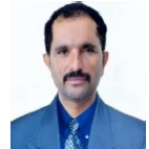
M V Jagannatha Reddy
Work place: Department of CSE, GITAM University, Bengaluru Campus, Bengaluru 561203, India
E-mail: mvjagannathareddy@gmail.com
Website:
Research Interests:
Biography
M V Jagannatha Reddy is presently working as Assistant Professor in the Department of Computer Science and Engineering, GITAM School of Technology Bengaluru Campus,GITAM [Deemed to be University].He received B.E.,M.Tech., and Ph.D from Reputed universities in India. He published 25 research papers in various conferences and journals. He also received and successfully completed one minor research project worth Rs.2.05 lakhs from UGC. He published one Book chapter in wiley publications. He also has three patent ane book publication to his credit.
Author Articles
Evaluation of Tennis Teaching Effect Using Optimized DL Model with Cloud Computing System
By Sai Srinivas Vellela M Venkateswara Rao Srihari Varma Mantena M V Jagannatha Reddy Ramesh Vatambeti Syed Ziaur Rahman
DOI: https://doi.org/10.5815/ijmecs.2024.02.02, Pub. Date: 8 Apr. 2024
Evidence from psychology and behaviour therapy shows that engaging in sports activities at home might help alleviate stress and depression during COVID-19 lockdown periods. A clever virtual coach that provides table tennis instruction at a low cost without invading privacy might be a great way to maintain a healthy lifestyle without leaving the house. In this article, we look at creating the second main constituent of the virtual-coach table tennis shadow-play training scheme: an evaluation system for the effectiveness of the forehand stroke. This research was carried out to demonstrate the efficacy of the suggested bidirectional long-short-term memory (BLSTM) model in assessing the table tennis forehand shadow-play sensory data supplied by the authors in comparison with LSTM time-series investigation approaches. Information was collected by tracking the rackets of 16 players as they performed forehand strokes and assigning assessment ratings to each stroke based on the input of three instructors. The scientists looked at how the hyperparameter values, which are chosen via an optimisation approach, affected the behaviour of DL models. The adaptive learning differential approach has been introduced to enhance the functionality of the standard dragonfly algorithm. Optimal BLSTM settings are selected with the help of the enhanced dragonfly algorithm (IDFOA).
The experimental findings of this study indicate that the BLSTM-IDFOA is the most effective regression approach currently available.
Other Articles
Subscribe to receive issue release notifications and newsletters from MECS Press journals